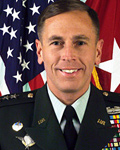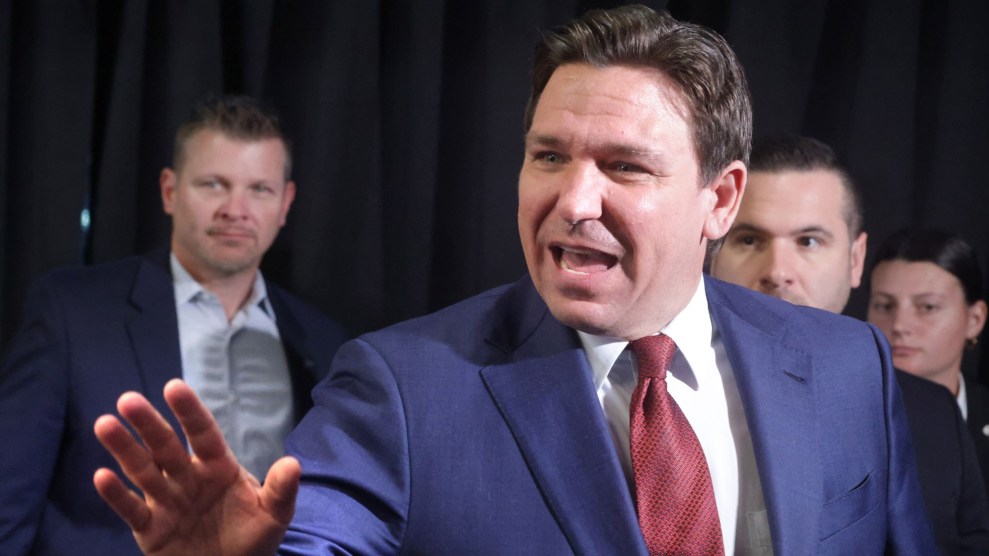
Within the military, the White House, and the halls of Congress, General David H. Petraeus has become a near-mythic figure, which is perhaps fitting for a man who has been handed the superhuman task of bringing order to the seemingly intractable chaos in Iraq. Regarded as a straight shooter by Republicans and Democrats alike, and well respected among current and former military officials, his name has been invoked alongside those of legendary military leaders (among them Dwight Eisenhower) and tales of his keen intellect, competitive flair, and grit abound. According to one piece of Petraeus lore, several days after taking an M-16 round to the chest during a training mishap in 1991, he rose from his bed, dropped to the floor, and proceeded to do 50 pushups.
Colonel William Darley, the editor of the army-run journal Military Review, served under Petraeus while he was the commanding officer at Fort Leavenworth, home to the elite Army Command and General Staff College, where, among other things, Petraeus oversaw the drafting of the military’s oft-touted Counterinsurgency Field Manual. Darley describes him as “a genuine soldier-scholar-diplomat” and a “lead by example” type of officer, adding that he is also “the most competitive person I have ever known—ever.” He will not just beat you, Darley says, but “make a point of it.”
“This guy is a major intellect with vision and discipline and drive—and he can do more one-armed push-ups than anyone I know,” says Lieutenant Colonel John Nagl, a member of the writing team that produced the Counterinsurgency Field Manual. Nagl met Petraeus twenty years ago while interning at Supreme Headquarters Allied Powers Europe, where Petraeus served as a speechwriter to then-NATO military commander General John Galvin. He recalls going running with Petraeus last year at Fort Sill in Oklahoma, where, he says, the general left men 20 years his junior “trailing in his wake and, literally, gasping for breath.
“He’s been shot in the chest, he has a shattered hip, and he ran me into the ground,” Nagl says.
Just as legendary as his competitive streak and fanaticism for physical fitness is Petraeus’ ambition. A three-decade career in the military has seen him graduate at the top of his class at West Point, earn a Ph.D. from Princeton, and, most recently, receive his fourth star as a general. But in the eyes of some of his critics (who call him “King David”), his ambition reads as grandstanding and self-promotion. This image was no doubt reinforced in July 2004 when Petraeus, then in charge of training Iraq’s security forces, appeared on the cover of an issue of Newsweek that bore the headline, “Can This Man Save Iraq?”
Petraeus’ leadership qualities, combined with his role as the Bush administration’s last hope for saving face on Iraq, has set off speculation that the general could run for office some day—possibly the presidency, in 2012. “This man is a walking mass of ambition,” says a former senior intelligence official. “I’m sure he’s thinking about Dwight Eisenhower every day. I know people who know him and they all think that’s true.”
The Petraeus-for-President scenario is out there, confirms Steve Clemons, a senior fellow at the New America Foundation and author of the popular beltway blog, the Washington Note. “A lot of people around him are beginning to think it’s the natural way.” Petraeus, he adds, could find himself on a “Wes Clark-like track, but on the Republican side.”
Then again, cautions the former intelligence official, “Unless you’re Dwight Eisenhower, George Marshall, or Douglas MacArthur, the chance that anyone is going to take you seriously, it’s not very high. Look at Wes Clark. He’s a bright fellow, but people just don’t give a shit about him enough to make that a possibility. But if you came back from Iraq and there was a reasonable outcome, then a guy as attractive and well spoken as Petraeus would become a possibility.”
A military official and longtime friend of Petraeus says he has “extraordinary political instincts,” noting that he has put them to the test in Iraq in his negotiations with tribal leaders and the country’s fractious political parties. “He would absolutely shoot me for saying this, but the nation would be very well served” if he ran for office, the official says.
So, if the general does harbor political ambitions, would that reflect on the progress report he is to deliver to Congress this week? One former military official who served in Iraq suggests that his reputation might be better served by providing a “rational assessment,” even if that puts him at odds with the White House. “If he were to defy the president bent on distorting the truth, he would be honored many times over.” On the other hand, the official adds, “If ambition starts to overrule duty, then we have a problem.”
Lawrence Korb, a senior fellow at the Center for American Progress who served as an assistant secretary of defense during the Reagan administration, worries that Petraeus could try too hard to accentuate the positive in Iraq. He has called Petraeus “the most political general since General [Douglas] MacArthur,” who was considered a possible Republican contender in the 1952 election that ultimately went to Eisenhower. In particular, Korb points to a Washington Post op-ed Petraeus wrote a few weeks before the 2004 election, delivering an upbeat assessment of the progress made in training Iraq’s security forces. “That’s not something Eisenhower would do; MacArthur would do that,” Korb says. “With MacArthur he was basically trying to influence the policy.” Which means, Korb says, that Petraeus’ Iraq assessment should be taken “with a grain of salt given his previous track record.”
Last week, nearly three years after Petraeus reported signs of “tangible progress” in his Washington Post op-ed, while acknowledging “tough times” ahead, an independent congressional commission headed by retired General James Jones, the former commandant of the Marine Corps, said that it will be at least another year before the Iraqi army can take the lead in providing security for the country. In far worse shape is the Iraqi police force, which the report said is “incapable of providing security at a level sufficient to protect Iraqi neighborhoods.”
Lawrence Wilkerson, the retired army colonel who served as Colin Powell’s chief of staff at the State Department, calls Petraeus a “good officer” but questions his work training Iraq’s security forces. “When he was associated with the training to get as many Iraqis stood up in the security arena, he was fascinated by numbers,” Wilkerson says. “I had people working in Iraq, both civilian and military, who emailed me on a daily basis telling me that Petraeus was more interested in numbers than he was quality and that the forces that were being ‘trained’ weren’t really viable. That’s pretty much come to pass.”
Wilkerson continues, “He’s part of this whole process the Bush administration has created, which is a bunch of military leaders who are either scared to death or so fascinated with their own power and ambition that they’re not willing to tell the emperor he’s got no clothes on.” Nevertheless, Wilkerson remains cautiously optimistic that Petraeus, together with Ambassador Ryan Crocker, will “provide a fair assessment of what’s going on over there, with all the warts.”
In terms of what Petraeus will say when he appears before Congress on Monday, “he has kept his thoughts very close to his chest,” a person close to the general says. Reports that have trickled out over the past couple weeks indicate that he is likely to recommend maintaining an enhanced troop presence in Iraq into next year, in line with the Bush administration’s stay-the-course stance. In a letter to troops on Friday, previewing what he planned to tell Congress, Petraeus was optimistic, while conceding that progress has not been “uniform.” Describing the situation in Iraq as “exceedingly complex,” he told the troops that “we are, in short, a long way from the goal line, but we do have the ball and we are driving down the field.”
Meanwhile, the faint rumblings about an eventual Petraeus candidacy grew a bit louder in advance of his appearance on the Hill. On Thursday, the New York Sun ran an editorial suggesting a scenario in which the general rebukes congressional Democrats for “undermining” his mission and threatens to resign to take his “case to the voters in a run for the presidency on a campaign to finish the work of winning the war.”
Most other observers see that as far-fetched. “I’m quite convinced that he’s 100 percent concentrated on conducting the war,” says Stephen Biddle of the Council on Foreign Relations, who met with Petraeus last spring as part of a team sent to Iraq to assess the effectiveness of the surge. “I don’t think that I’ve seen any evidence that some desire for high political office is somehow polluting or distorting his judgment about Iraq.”
For his part, Petraeus is clearly aware of the speculation—and doing nothing to either fan or discourage it. “I’ve heard him laugh every time anyone brings up the political aspects,” says Colonel Steve Boylan, Petraeus’ spokesman. Downplaying the Eisenhower comparisons, he likens Petraeus instead to General George Marshall, the army chief of staff during World War II, who refused to vote in order to remain above politics (just as Petraeus has done since joining the senior leadership, Boylan notes). “I’ve heard him state on the record and in various venues that he has no political leanings and that he plans on being a soldier for the foreseeable future,” Boylan says. “What happens five, 10, 15 years from now, who knows?”

















